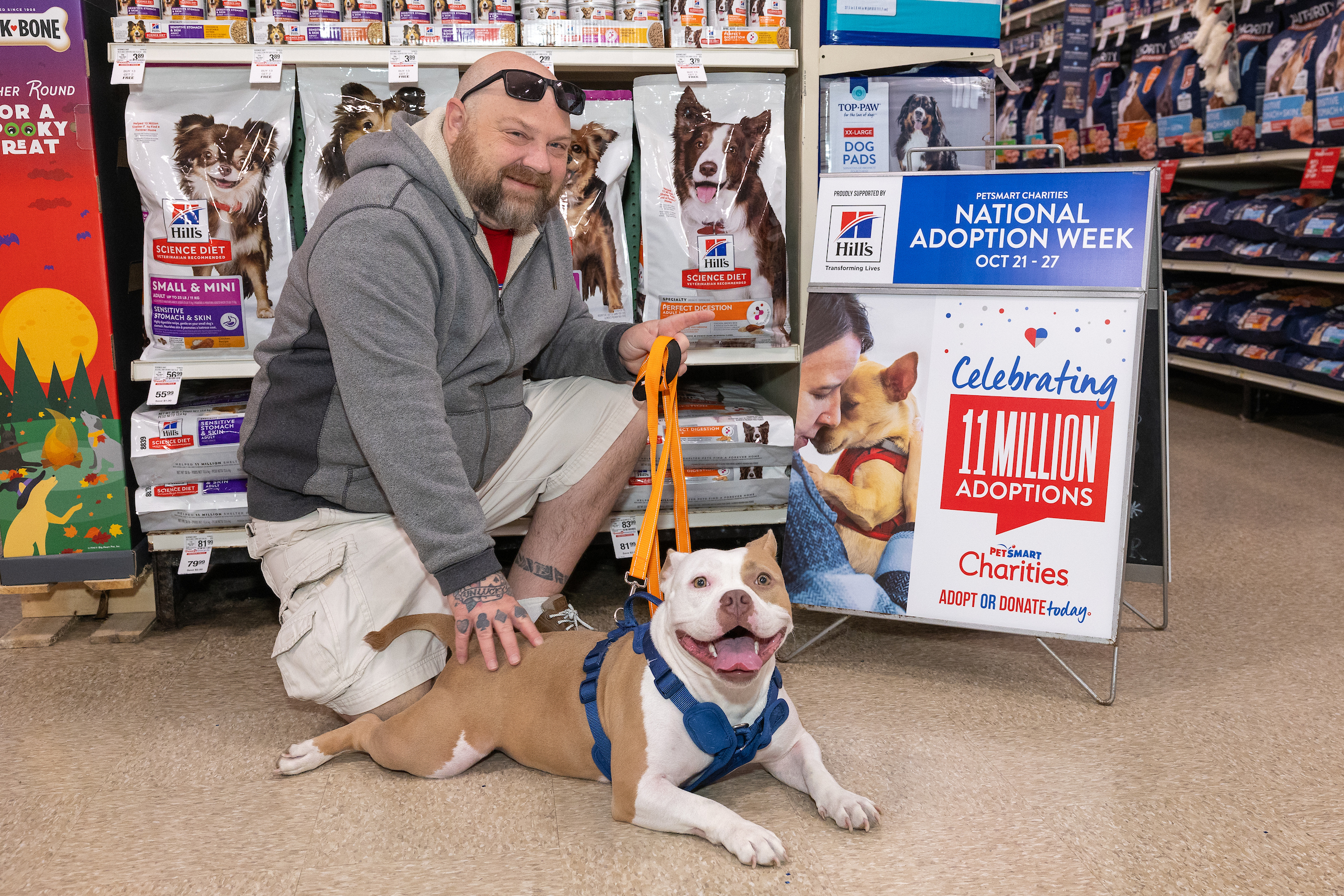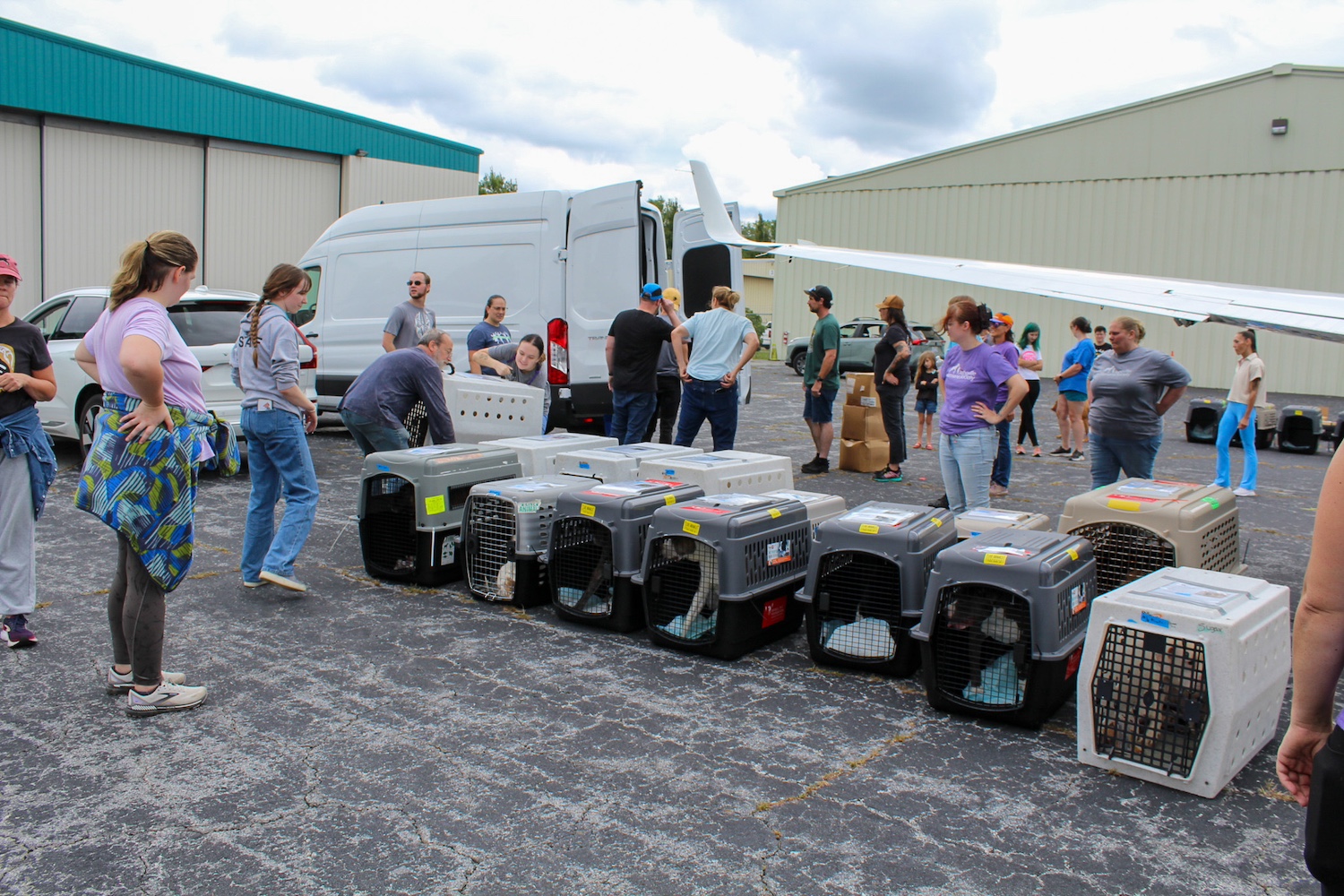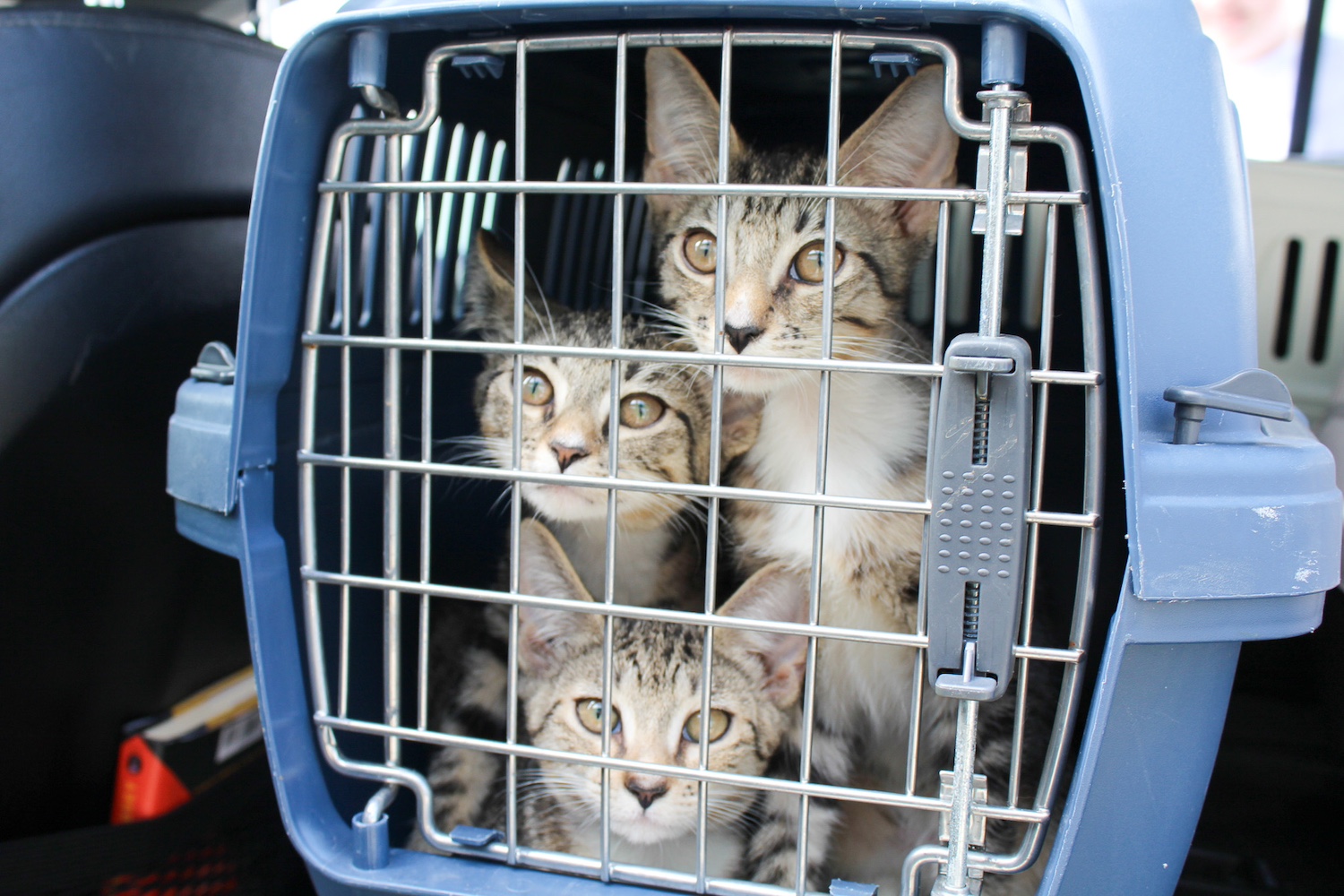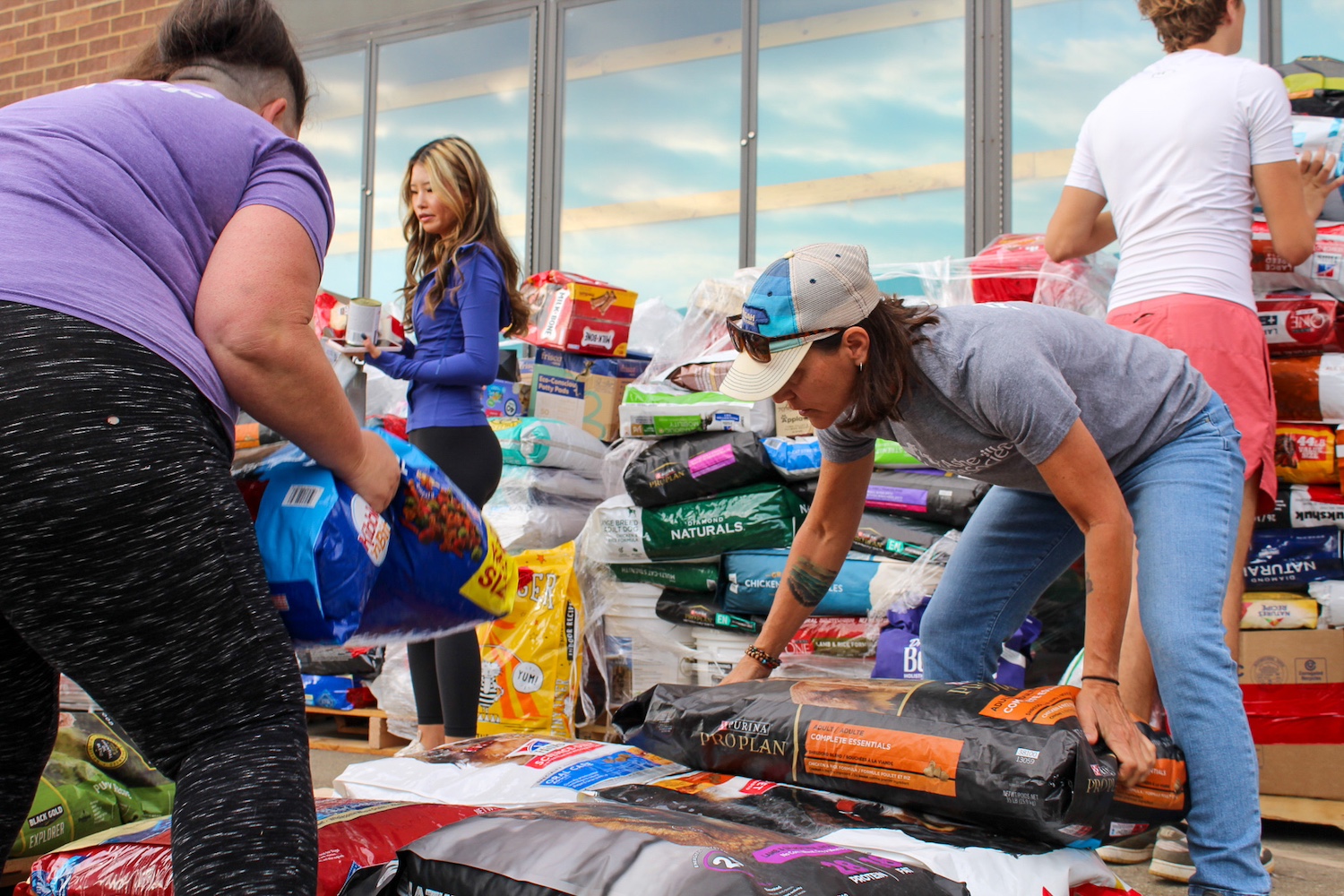
A member of the Asheville Humane Society holds a rescued dog during the organization's Hurricane Helene recovery efforts. (Image: Asheville Humane Society/Flickr)
Many animal shelters were already at capacity before Hurricanes Helene and Milton hit the East Coast this fall. Displacement caused by the storms further strained shelters, exacerbating the crisis. Fortunately, individuals and businesses have stepped in to help. PetSmart Charities, for one, is raising financial support and running a nationwide adoption drive.
Adoptions across the country help pets in areas hit by hurricanes
PetSmart Charities’ National Adoption Week — which ran most recently this October — brings adoptable pets from partnering shelters into PetSmart stores. This gives potential adopters the opportunity to consider bringing an animal home that they otherwise may not have met, including pet parents who weren’t initially looking to adopt. Over 11 million pets found homes over the event’s 30-year history.

The thrice-annual adoption drive happened to fall at the perfect time to help find homes and make room for storm-impacted animals in need of shelter. “About 19,500 animals found homes,” Aimee Gilbreath, president of PetSmart Charities, told TriplePundit. “So it was unintentionally great timing to be able to have a big adoption opportunity right after the storms happened.”
Regardless of where in the country pets are adopted, decreasing the nationwide shelter population benefits areas hit by hurricanes or other emergencies. It makes space for existing shelter pets to be transported out of a storm’s path, and it opens up capacity for the pets that are subsequently displaced, Gilbreath said.
Reuniting pet families after Hurricane Helene
“We actually increased our stray hold to 30 days,” Jen Walters, the interim executive director at the Asheville Humane Society, told 3p. The organization was able to make room in its kennels by transporting 100 pets to shelters in other areas when Hurricane Helene hit Asheville, North Carolina, in September.
Under normal conditions, the stray hold in North Carolina is just 72 hours, Walters said. The longer hold period increased the chances that pets separated from their families during Hurricane Helene could be reunited.

“The last thing that we wanted was for somebody that lost their home or their vehicles or personal possessions, or even in this area, their family members, to then be separated from their pet,” Walters said. “Without those transports, that 30-day stray hold period would have been even more of a challenge than what it was for us.”
Shelter workers across the region worked tirelessly to get lost pets back to their families, including tracking owners down through social media when the phone numbers listed on collars and microchips were out of date, Gilbreath said.
The ultimate goal is to keep pets from being separated from their families in the first place. “If you look at the long arc of history since Hurricane Katrina, [it] was an absolute disaster for humans and for pets,” Gilbreath said. “We've gotten much better at incorporating pets into the planning long before the storm hits, so now there are options for you to evacuate with your pet.”
In addition to pet-friendly emergency shelters and an increase in hotels that allow pets, pet parents in hurricane areas are taught about the importance of including pets and their needs in emergency kits, she said. And disaster response agencies are including pets in their planning, too. PetSmart Charities provided the Red Cross with a $2 million grant to incorporate pets into their system.
“We don't see as many pets separated from their families in a disaster as we did 20 years ago,” Gilbreath said. “If there's anything that is good news about [Hurricane] Katrina, it forced us all to rethink the way that we did disaster planning and disaster response to include pets.”

What shelters still need
There’s always something that can be done to help shelter pets. “I think the biggest message is that your local shelter needs you,” Walters said.
Families and individuals can make the biggest difference by adopting a shelter pet, but for those that aren’t sure about adopting, fostering is another option, she said.
Gilbreath said she encourages people to take foster pets out in public where they can meet potential adopters. By taking a foster dog to a dog-friendly restaurant or packing a foster kitten along on your daily walk, you might help them find a new family.
“I had a puppy I fostered in Philadelphia on a business trip in a hotel room," she said. "And that cutie sold himself on the way to Starbucks at 6:45 a.m. on a Saturday because he introduced himself to a man we were walking by on the street, who had no intention of getting another dog but fell in love with the puppy and sent his family to adopt him later in the day ... That's the magic of fostering.”
Corporate sponsors make a big difference
The devastation caused by Hurricanes Helene and Milton made donations more important than ever for animal shelters. Grants from businesses go a long way, especially when they have the power to motivate their customer base. PetSmart Charities has sent out roughly $660,000 to help animals impacted by the hurricanes, Gilbreath said. She credited pet lovers with coming up with the money through small donations at the register.

The Asheville Humane Society received $25,000 of those funds, which it’s used to support pet families, Walters said. The pet food and supplies that money provides could make the difference between a family being able to keep their pet or not, as many have lost jobs, homes and more.
“Without the support that they provide during disasters, and then all year round, we really couldn't accomplish what we do to support our community and support the pets that are currently in the shelters,” Walters said.
There is no easy fix
Shelter pets will continue to need support, even more so as hurricanes and other natural disasters worsen from the climate crisis. The shelter system is already stretched thin as the price of pet care rises along with other necessities, forcing more people to give up their pets
Businesses can help with donations, of course, but also by sponsoring adoption events, or encouraging employees to adopt by offering pet-friendly offices and pet benefits as a part of their compensation packages. While the problem won’t go away overnight, together, we can put a dent in it.

Riya Anne Polcastro is an author, photographer and adventurer based out of Baja California Sur, México. She enjoys writing just about anything, from gritty fiction to business and environmental issues. She is especially interested in how sustainability can be harnessed to encourage economic and environmental equity between the Global South and North. One day she hopes to travel the world with nothing but a backpack and her trusty laptop.














